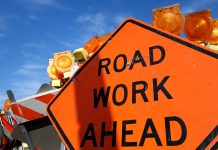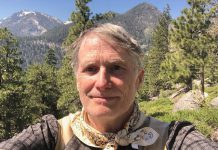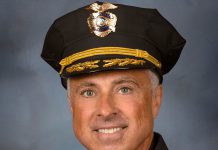As residents of Boulder Creek will tell you, having access to a clean and reliable water source is a big deal. The disruption to water services due to the CZU August Lightning Complex affected vast swaths of Boulder Creekans; from Do Not Boil orders to simply no water at all, the basic infrastructure of the town’s water system took a hard hit during the fires, and some residents are just now returning to normal water use and consumption.
Like electricity, internet and cable, water is generally taken for granted, and it’s only when access to it is disturbed that folks realize how precious a commodity it is. The San Lorenzo Valley Water District Board of Directors understands the importance of this provision, and it takes its roles seriously when it comes to serving the nearly 7,900 residential and business customers of the District’s 60 square miles. In November, the make-up of the Board will be tested, as new candidates attempt to bring their expertise and voices to serve the San Lorenzo Valley. Directors Lew Farris and Rick Moran were both appointed in 2019, and their terms expire in December of 2020, opening the door for newcomers to introduce themselves as candidates for those seats.
We asked the four candidates the following questions:
1. Please share your candidate statement.
2. What are the main challenges you see facing the Water District? Are they dramatically different in the wake of the CZU August Lightning Complex?
3. How do you see your potential role with the district? Do you believe you would be more aligned with the board’s position on topics, or as a community advocate for ratepayers?
4. What differentiates you from the other candidates who are running for the open seats?
LEW FARRIS
1. My name is Lew Farris. I am an appointed member of the San Lorenzo Valley Water District Board of Directors, seeking re-election this year. Growing up in Southern California, I enrolled at the University of California, Irvine, graduating with a degree in Chemistry in 1973. I worked in the biotech industry for more than 30 years, specializing in design and manufacture of blood test kits. The last 10-plus years I have worked as an international regulatory consultant, auditing companies to ISO 9001 (general industry) and ISO 13485 (medical devices). I recently volunteered at the Santa Cruz County Sheriff’s headquarters as a biostatistician in the Coroner’s department. My work with the coroner’s office led me to receive the Volunteer Center of Santa Cruz County’s “Be the Difference Award” for 2018. I have been involved with SLVWD since 2014 (first on the Citizen’s Action Committee, then Chair of the Engineering Committee, and finally appointed to the Board).
2. The main challenges facing SLVWD are:
- Fire damage: repairing fire damage to the North System (e.g. Lyon facility). It is critical we maximize FEMA reimbursement for this work.
- Crumbling infrastructure: it is estimated that between 10% and 20% of the potable water from the two processing plants are lost to leaks in pipes and tanks. The District’s infrastructure has been woefully ignored for decades, and it is costing us dearly.
- Customer outreach: It cannot be stressed enough that dialogue between Board/staff/ratepayers is crucial to our success. Listening and working together is pivotal in taking SLVWD to the next level.
- Financial sustainability: In the last few years, rate increases have barely kept up with expense increases. This is not sustainable going forward. We need to both innovate our revenue stream, and efficiently reduce expenses.
- Environmental concerns: lest we forget during these trying times, we must ensure that environmental issues are foremost in our minds in everything we do.
3. I see my role as continuing to act as I have for the last 18 months. Being an appointed member to the Board of Directors, my watch-words are “represent ratepayers interests and listen to District staff.” Further, my education in chemistry, coupled with experience in building large volume/high purity water systems, makes me uniquely qualified to head the Engineering Committee, and serve as a Board member on SMGWA. I definitely see myself as a community advocate for ratepayers. As a past member of senior management in the Biotech Industry, and leading multi-million dollar capital projects, I learned that being inclusive in problem-solving cannot be overstated.
4. As a scientist, my decision-making approach is always to research the facts, then apply the scientific method. This has served me well in industry, and directly applies to my situation as a Board member. Also, having engineering experience helps me to contribute to the District capital improvement projects. And lastly, working in the biotech industry requires constant innovation. What worked well in the past probably won’t work as well in the future. In other words, creative thinking prevents one from becoming a dinosaur. One last comment, you have four candidates running for two positions on the Board. I believe in the will of the people, so please vote, and give thanks to the candidates for running (e.g. giving of their time and money to serve in a largely volunteer position). Give each candidate proper consideration and voting will be easier.
GAIL MAHOOD
1. As a retired Stanford University geology professor, my scientific expertise includes: how geology and climate change affect the hydrology and biology of our watershed; groundwater issues; water quality (including post-fire contamination), and geologic hazards that could impact SLVWD facilities (landslides, earthquakes, floods, debris flows). My administrative experience included serving on the University’s budget and strategic planning group and the Land and Building Committee, which honed my skills in capital planning and multi-year budgeting. In numerous leadership roles, including Chair of the Faculty Senate, I ran effective meetings and brought people together on important, challenging decisions.
I have served on the SLVWD Engineering Committee since 2019, and for a year have informally advised SLVWD representatives to the Santa Margarita Groundwater Agency on the groundwater sustainability plan. If elected, I’ll apply my experience and scientific expertise to ensuring a reliable supply of clean water for the future at a reasonable cost.
2. Pre-fire, the main challenge facing the District was its structural deficit: if we made infrastructure upgrades and contributions to retirement funds at the rate we should, our annual expenses would exceed revenues by $2-3M/year. The financial situation became even more daunting post-fire. FEMA reimburses 75% of costs to replace destroyed infrastructure, so the District must aggressively pursue state and federal programs to pay for more of the remaining 25% to lessen the burden on ratepayers.
The District faces a number of major decisions. How do we replace 7.5 miles of burned pipeline: HDPE or more costly ductile iron? Above-ground or buried? How do we meet water needs for the next 2-3 years while debris flows threaten creek intakes? Given fire and debris-flow hazards, should we reconsider the balance between surface water and groundwater in our water supply? Making good decisions will take a combination of technical expertise and financial discipline.
3. To me, the primary roles of the Board are to set District priorities in collaboration with District staff with input from ratepayers, and to safeguard the current and future financial stability of the District. In my opinion, Board meetings frequently bog down on minor matters, while breezing over decisions that have expensive consequences. If elected, I would work to make Board meetings more efficient so that more time could be devoted to important issues, and would encourage use of Robert’s Rules of Order to better organize consideration of issues. I would also devote time to writing clear summaries for Facebook and NextDoor of work the District is undertaking and the reasoning behind decisions made by the Board and staff. The goal would be to provide ratepayers with a better understanding of the District’s operations and a platform for them to ask questions and provide feedback.
4. If elected, I would bring to the Board deep scientific expertise on a range of scientific topics of direct relevance to SLVWD, extensive experience in bringing together people with widely varying opinions to make tough, important policy and financial decisions, and the desire and ability to communicate clearly with ratepayers. Useful under normal times, I think my expertise and experience would be especially helpful to the Board and the District during this difficult post-fire recovery period.
I am results-focused, so would work with other Directors and the staff to find the middle ground on contentious issues. And when a compromise can’t be reached, I would model respectful disagreement. I have neither agenda nor political aspirations; I am just offering to help the Valley I now call home.
BETH THOMAS
1. I moved to the San Lorenzo Valley in 1979 and took up residence at the Quaker Center in Ben Lomond. I have raised four children in the valley and worked in education as a librarian for 27 years at the San Lorenzo Valley Unified School District. Through volunteering for union duties I found my political voice and completed my career as a Director of Education and Training at SEIU Local 521, where I also served in Senior Staff Management, Human Resources and as a Chief Contract Negotiator. I am currently retired from union work and have a bookbinding studio in Ben Lomond, where I reside.
My interest in serving on the SLVWD Board began during the 2018 election and subsequently led me to participate actively in the district through meetings of the Board and committees and as Chair of the district’s Facilities Committee. I am committed to supporting the progress of the last two years.
2. The main challenge faced by the district right now is the restoration and restructuring of the portion of the water system that was damaged in the CZU fires as well as mitigating the potential for debris flow damage in burn areas that coincide with the water system infrastructure. Many decisions need to be made quickly and wisely.
These challenges cannot be faced effectively without a collaborative and healthy board which at its heart is a reflection of the community and has as its first priority the best interests of the community which elected it. Previously this has been a challenge for the SLVWD. If you have lived in our community for more than a couple of years you will recall that the actual work of the board was severely impeded by a very divisive and disruptive organizational culture which wasted much time and vast sums of money and the relationship with the community was abused.
3. A person who is elected by the community is first and foremost a representative of and advocate for that electing body. Inattention to this principle in the past ultimately created big problems for the board, the district and for the community it served. I will promote the continuance of the 2018 board’s efforts to increase public participation and awareness of the work that is being done on their behalf. Never again will a member of the public be treated disrespectfully in a public meeting by a board member. A board member is elected to carry out the business of the public, setting policy, monitoring the budget and use of the funds that ratepayers provide for the delivery of safe and affordable water and protecting the environment of the district’s watershed. A board member who does not see these things as her role and responsibility does not understand what a board should be doing.
4. My priorities for the board of the SLVWD are not shared by all candidates. The district’s paid staff already includes; scientists, water quality specialists and engineers and are led by an excellent operations manager. I believe that board members need to be true representatives of the community by which they are elected so that they can effectively represent the interests of that electing body and do what board members are actually tasked with doing; setting and overseeing policy, managing finances and being accountable to ratepayers.
A comprehensive approach to budgeting is necessary in overseeing the fiscal health of the district. I believe that staffing is not the first or only place to make cuts, as has been stated by another candidate when comparing staffing levels to the Scotts Valley Water District. SLVWD is not comparable to SVWD (half as many connections) and our staffing needs are not comparable.
TINA MARIE TO
1. I have attended more SLVWD meetings than the non-incumbents combined. As an environmental scientist, I believe our water is the critical life force of our valley. My frequent attendance at the SLVWD meetings, Friends of SLVW meetings, and SMGWD meetings means I am up to date on the needs of the district. I am an active community member and regularly offer my time and resources to help our community. I have a bachelor’s degree in Law and Earth Science from UC Santa Cruz and a masters in environmental science.
2. The district is already looking at fiscal difficulties in the future due to pensions. Now that the monetary reserves have been depleted to half of what they were only two months ago, the District’s finances need to be taken more seriously. This means making difficult, often unpopular decisions. I want to create a strong financial position while expanding the Low-Income Rate Assistance program that is currently in its trial phase. This is critical because the water district needs the money to build its infrastructure, prepare for future emergencies, and provide water to all residents, regardless of their ability to pay.
2. This question assumes that the board actions are at odds with the ratepayers, which isn’t true. The community group Friends of SLVW—which I am a member—works as a liaison between the voices of the community and the board to advocate for environmentally sustainable and financially responsible decisions while ensuring the needs of the community are served. So far the Board has been receptive to the FSLVW’s citizen input regarding various measures. The board listens to community members that attend the meetings. As a SLVWD Board member, I want to be a listener and a liaison.
3. I have been attending the Water District meetings for the last two years. Among the non-incumbents, I am the most informed candidate on the issues. I consistently speak up in meetings and ask questions from the board and staff. I am engaged in the community by volunteering my time and resources to various local nonprofits and events. Vote Tina Marie To for SLVWD.












